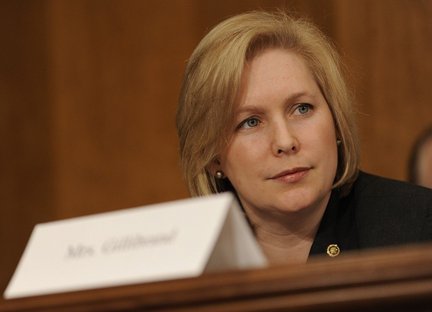Sen. Kirsten Gillibrand’s (D-N.Y.) proposal to take the decision to prosecute sexual assault and other important criminal cases in the military away from commanders and put the decision in the hands of military lawyers was stymied in the Senate on Thursday. The 55-45 vote for her bill did not give her the 60 votes the bill would need to bypass a filibuster.
The opposition to Gillibrand’s bill was led by Senator Claire McCaskill (Mo.) and Democratic Sens. Carl Levin (Mich.), both Democrats. Gillibrand was supported on the other side of the aisle by Senate Minority Leader Mitch McConnell (R-Ky.), Sen. Ted Cruz (R-Texas), and Rand Paul (R-Ky.)
Gillibrand said, “For a number of people an incremental step was more meaningful to them and they wanted to see what happens. I think there will be many more senators who will side with us [next time].”
The incremental step is represented by McCaskill’s own bill, which is virtually the same as Gillibrand’s but does not take the decision to prosecute away from commanders. McCaskill said, “We had one honestly held policy difference and that was voted on today. I’m confident the choice the Senate made today is the right one for victims of sexual assault.”
Although Gillibrand has asserted that her bill need to be passed because victims aren’t reporting sexual assault crimes for fear that their commanders will take revenge upon them, Pentagon brass has said that commanders needed the decision-making power to maintain accountability.
McCaskill said that the effort to take the decisions away from commanders had distracted people from noticing how effective the reforms from last year’s National Defense Authorization Act (NDAA) have been. She said, “What I’m most frustrated about is not whether we voted on this or not, but the fact that a long list of historic reforms have been totally overlooked, because there is one policy difference in this one discrete area.” The NDAA reforms removed commanders’ power to overturn guilty verdicts, forced those convicted of sexual assault to be discharged and gave victims more power to find legal representation.
Just before Thursday’s vote, Stars and Stripes reported that the top Army prosecutor for sexual assault cases had been suspended; he allegedly attempted to grope and kiss a subordinate.
Gillibrand had charged that leaving commanders with the decision-making power was ” … like your brother committing the sexual assault and having your father decide whether to prosecute. The victims and the survivors of sexual assault have been walking the halls of Congress asking that we do something to protect them.”
Sen. Chuck Grassley (R-Iowa) agreed, saying, “We’re passed the point of tinkering. … The current structure of the military justice system is having a deterrent effect on reporting. Sexual assault is a law enforcement matter, not a military one.”
But McCaskill answered, “The policy changes that are being advocated will not work for victims. When these changes have been enacted other places, reporting has not been increased.” Levin, chairman of the Armed Services Committee, echoed McCaskill. He said, “The strongest, most effective approach we can take to address sexual assault is to hold commanders accountable. We must maintain the important authority to prosecute sexual assaults that our commanders now have.”

COMMENTS
Please let us know if you're having issues with commenting.